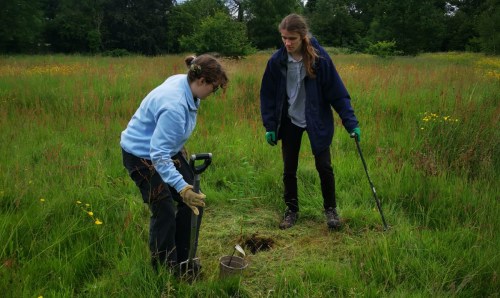
Environmental sustainability
We are deeply committed to environmental sustainability, which stands as one of the University's core 'Ethical Grand Challenges.' Find out about activities and events you can take part in this year as part of the Seeds of Hope and Action project.
Seeds of Hope and Action Exhibition
The Seeds of Hope and Action exhibition, developed by the Earth Charter and SGI UK, focuses on the UN’s Sustainable Development Goals (SDGs) and how individuals can learn, reflect, inspire, act and lead in our daily lives.
- Location: Sam Alexander Building Glass Corridor
- Dates: 20 March - 31 April 2025
The project fosters intercultural and international cohesion around the SDGs by engaging students worldwide in meaningful conversations and collaborative actions.
Seeds of Hope and Action Panel
Engage in a dynamic roundtable discussion with activists, artists, and academics focusing on climate and environmental justice. Together, we’ll generate innovative ideas and actionable solutions.
- Location: Sam Alexander Building SG.16
- Dates: 20 March 4pm until 5pm, followed by a reception until 5:30pm
Speakers include:
- Tom Ross - Leader of Trafford Metropolitan Borough Council. Portfolio Lead, Green City-Region, Greater Manchester Combined Authority.
- Dr Heather Alberro - Lecturer in Sustainability, Global Development Institute (GDI), University of Manchester.
- Dr Kelechi Anucha - Lecturer in Literature and Environmental Justice.
- Charlie Roberts - Activities and Culture Officer, UoM Students' Union.
- Hien Luong - PhD student & member of the of the Leverhulme Centre for Anthropocene Biodiversity, University of York; Buddhist practitioner, Soka Gakkai International.
Book your place: Seeds of Hope and Action Panel
Seeds of Hope and Action Pledge
Join students and staff worldwide in making individual and group pledges to support environmental sustainability.
- Make your pledge: My Seeds of Hope and Action
Seeds of Hope and Action Activities
A series of interactive activities are designed to engage students at the School of Arts Languages and Cultures and across the University.
These workshops emphasise actionable steps, foster creativity through cultural exchange, and inspire mindset shifts to address environmental challenges. Activities also provide opportunities to collaborate with local communities to develop creative climate solutions.
Tree planting volunteering

Help restore woodlands by planting native trees with the Peak Park Conservation Volunteers (PPCV) in the scenic Hope Valley.
PPCV need your help to plant 1,170 native trees in the stunning Leam Woodland, Hope Valley. We’ll be planting a mix of oak, field maple, silver birch, and hawthorn “whips” (young trees about 1–2 ft tall), then protecting them with lightweight tree guards and wooden stakes.
British weather is rather unpredictable, especially in February and March. You will need to be prepared for staying outdoors for a couple of hours on a cold and possibly rainy day. No prior experience is needed, bring your enthusiasm and enjoy a rewarding day in nature!
- Activity: Student Volunteer Day - Tree Planting in the Peak District National Park
- Location: Leam Woodland, Grindleford in the Hope Valley
- Dates: Sunday, 23 February 2025 and Sunday, 23 March 2025
- Times: 9am - 4pm
- Cost: £5 (includes round-trip train travel from Piccadilly Station)
- Book your place: This event is now fully booked.
This volunteering will count towards the Stellify Award as part of Make a Difference (community volunteering) which is a unique University of Manchester award supporting your personal development and graduate outcomes alongside your studies. It gives you the chance to make a difference in a way that feels authentic to you, your passions and interests.
Low-carbon East Asian food
Do you enjoy classic Chinese dishes like crispy duck, sweet and sour pork, or gongbao chicken? Have you ever wondered if a vegetarian could thrive in China?
Join us for a unique Chinese meal experience, where you'll savour low-carbon alternatives to popular Chinese dishes. Discover new ingredients and sustainable cooking techniques while enjoying delicious food. During the meal, we’ll have friendly, informal discussions about how small changes to our diet and eating habits can contribute to a more sustainable future. Each table will have a member of staff present to facilitate these conversations. Think of it as a chat over lunch rather than a formal workshop!
Let’s explore sustainable eating together and enjoy a taste of China with a modern, eco-friendly twist.
- Activity: Low carbon Chinese lunch discussion tasting
- Location: Sheng Lok Centre (meet outside the shop in the foyer of University Place, Oxford Road and walk 10 minutes together to the Centre)
- Dates: Tuesday 4 March, Tuesday 25 March, or Tuesday 6 May 2025
- Times: 1.10-2.15pm
- Cost: £5 (includes lunch and a drink with the meal)
South Asian recycling textiles workshops
Learn how to sew by hand at our recycling workshops. Reduce waste while having fun. Sewing kits will be provided.
- Activity: Make your own teddy bear
- Location: University Place
- Date: Friday, 28 March 2025
- Time: 2-4pm
- Book your place: Make your own teddy bear recycling workshop
- Activity: Transform your old T-shirt into a Tote Bag
- Location: University Place
- Date: Friday, 9 May 2025
- Time: 2-4pm
- Book your place: Transform your old T-shirt into a Tote Bag
Project contact details
- Karen Wang karen.wang@manchester.ac.uk
- Adele Aubrey adele.aubrey@manchester.ac.uk
Project partners
- Student Success, Volunteering and Awards, University of Manchester
- Peak Park Conversation Volunteers
- Creative Design Manufacture
- Wai Yin Society
- Soka Gakkai International UK
Project Funders
- SALC Social Responsibility Award 2024-25
Ethical Grand Challenges
The Seeds of Hope & Action project is aligned with the University’s ‘Ethical Grand Challenges’ programme. The Ethical Grand Challenges take place in each year of study. These workshops allow students to explore three of the biggest challenges facing the world in the 21st Century - Sustainability, Social Justice and Workplace Ethics.
